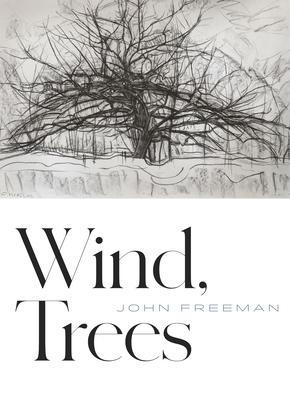John Freeman
Copper Canyon Press ($17)
by Joanna Acevedo
John Freeman’s third collection of poetry, Wind, Trees, has Freeman’s characteristic quietness: an understated, restrained quality which lends itself particularly well to post-pandemic writing. As a follow up to 2017’s Maps and 2020’s The Park, both also from Copper Canyon Press, Wind, Trees has a similarly dedicated focus; it is split into two sections, “Wind” and “Trees,” each of which have their own tone and point of view. Through exploration of form, repetition of ideas, and meandering of thought, the collection quietly stirs up issues of loss, friendship and partnership, and how to coexist in this dark yet brave new world.
Freeman is at his sharpest when he’s working with narrative—like in “Boxing,” one of the earliest poems of the collection, when the speaker tells the story of Carla, his sparring partner in London:
What, I don’t
work you hard enough? she said once,
catching me outside, still sweaty
in my trainers, then ran
me until I puked. What do you
want, she asked. Are you here
to hurt someone? We can do
that.
Many of the poems tell stories, and these are the most successful; they allow a window into the poet’s life and are more engaging than the more abstract poems, which tend to blur together. That’s not to say there aren’t some beautiful lines in the more enigmatic poems—there certainly are, and Freeman has a knack for distilling an observation about life or pain into a pithy one-liner—but the narrative poems have a true sense of grit to them.
As for the collection’s understated title, Wind, Trees does in fact elicit a sense of the wind in the trees—the sonic sense is very strong, and Freeman puts lines together masterfully, playing often with internal rhyme and meter. In “The Heat Is Coming,” he brings this sonic play to a high level, with lines that rhyme and break and rhyme again:
The ocean is dying but we’re dying of
thirst, the power grid over Paris just burst,
they think it’s hackers from Novosibirsk . . .
This has a humorous effect, but the theme of the poem is grave. The juxtaposition of humor and significance is one that appears throughout the collection, and often to great success. At other times, Freeman turns tender; in “Nothing To Declare,” he writes:
What kind of heaven
would it be if I
couldn’t take you
This poem emerges as the heart of the collection: For all the stories told, jokes made, and fears shared and overcome, the answer to all these big questions is love. It is a redemptive mission, and one that has been hard-fought. In this way, Wind, Trees is a meditation on not only loss, but also love, and the way that although love can cause us pain, it can also heal even the deepest of wounds. We are not alone, Freeman argues. And perhaps we never were. Wind, Trees is a fascinating exploration not only of pandemic loneliness, but of the ways we begin to cope with our own isolation and process loss. The collection comes at the perfect time; as a society, we are starting to heal, and poetry such as thismay be able to help those who are looking for ways to face their isolation and get better.
Click here to purchase this book at your local independent bookstore:
Rain Taxi Online Edition Winter 2022-2023 | © Rain Taxi, Inc. 2023


